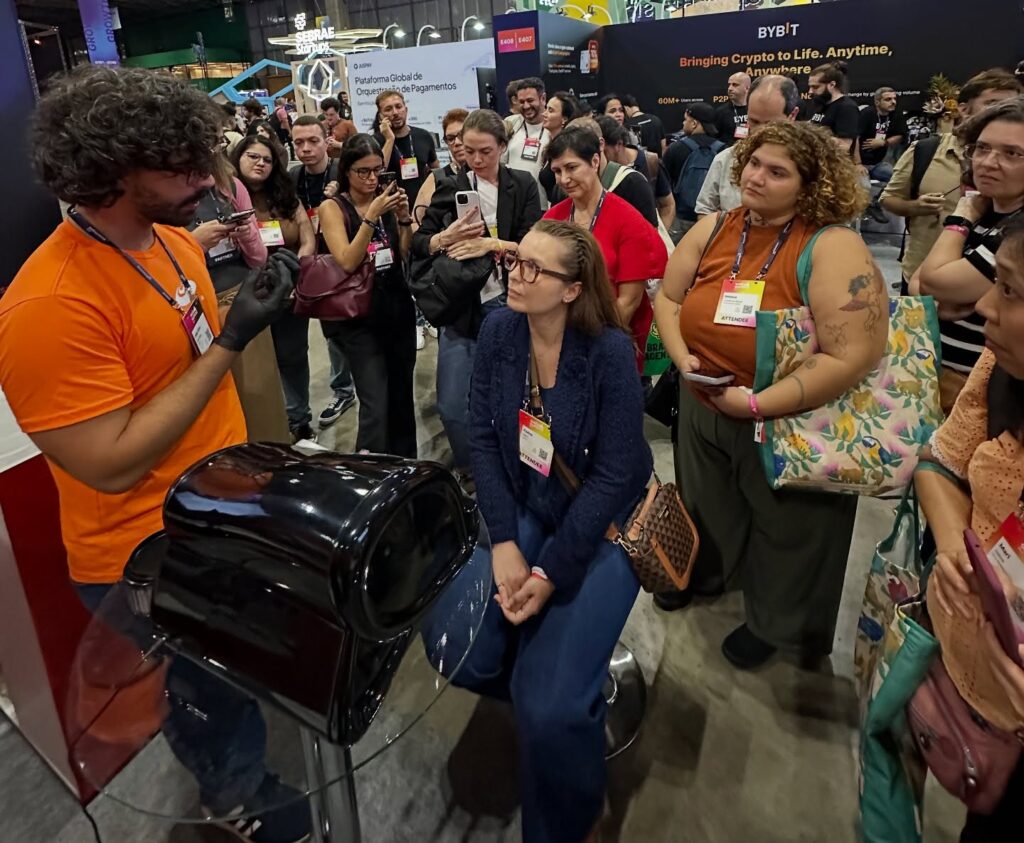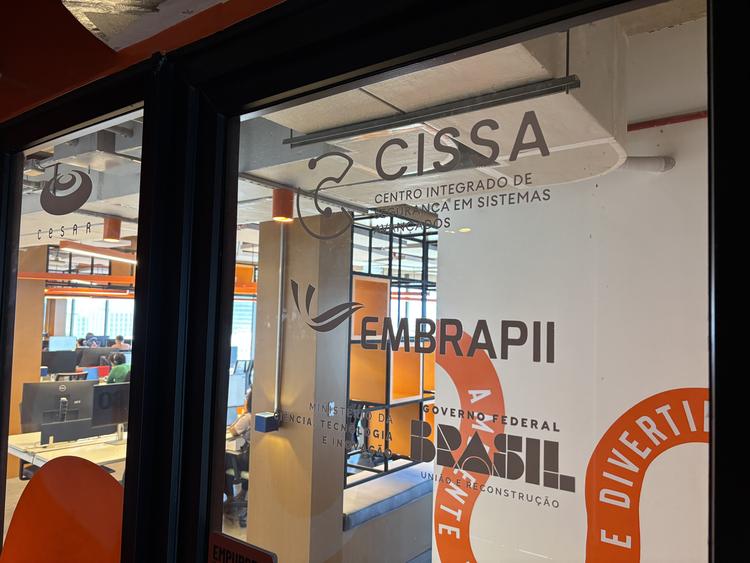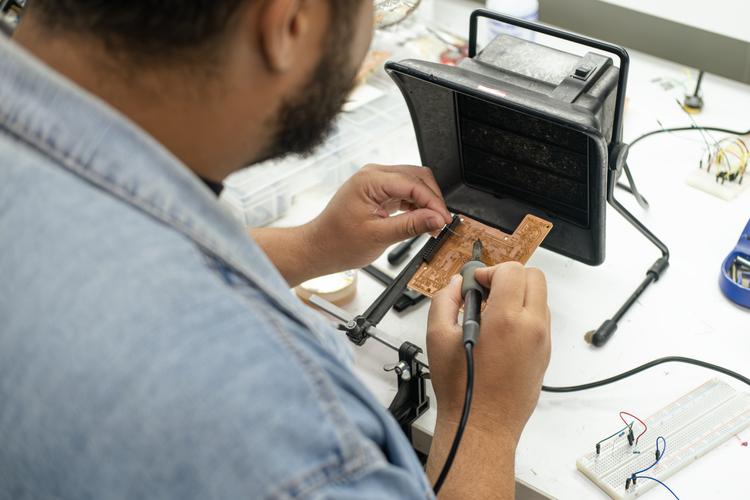7 mins to read
CESAR .
Publicado em: 13 de maio de 2025
The Future of Technology in Focus: AI, Energy, and Cybersecurity at Web Summit Rio 2025

For three days, Web Summit Rio 2025 transformed Rio de Janeiro into one of the world’s premier stages for innovation and technology.
The event brought together more than 30,000 participants—including investors, business leaders, international corporations, specialists, and entrepreneurs—to discuss the topics shaping the future of technology.
Key highlights included:
- The development of Artificial Intelligence (AI) for sustainable solutions
- The energy transition and the strengthening of clean technologies
- The promotion of diversity and inclusion within the innovation sector
- Technological solutions with positive social impact
The in-depth discussions at Web Summit Rio generated new business opportunities and offered insights into conversations that are already shaping the present—while projecting the new trends we’re preparing for in the future.
CESAR’s Strategic Presence at Web Summit
As Brazil’s most comprehensive center for innovation and knowledge, CESAR played a strategic role at the event:
- We showcased standout initiatives and shared the results from the first year of operations of CISSA, the Embrapii Competence Center in Cybersecurity.
- From one of stages, CESAR CEO Eduardo Peixoto discussed how our impact-driven solutions, advanced technologies, and design-centered approach are redefining the digital future.
- We led a masterclass on end-to-end innovation in the financial sector and presented the Smart Lipstick® developed by Grupo Boticário in partnership with CESAR, Neurobots and Embrapii.

Key Trends and Discussions Mapped by Our Experts
💡 Agentic AI: A New Technological Paradigm
Among the 400+ sessions, one theme stood out: AI through the lens of the “Agentic Era.” On the main stage, Marcio Aguiar, executive director at NVIDIA, explained how AI—having moved through perceptive and generative phases—can now transform technological potential into business value.
“As we gather more data and develop new ideas for how to use it, we need to scale our pre-training processes. You must prepare your datasets to meet your business needs.” — Márcio Aguiar
🔗 You can also read: Petrobras, NVIDIA and CESAR develop a High Perfomance Computing solution
What is Agentic AI?
Agentic AI is powered by autonomous agents capable of executing complex tasks based on data and pre-set goals. According to Aguiar, it’s essential to have a plan that expands AI use beyond IT departments, making it strategic across the organization.
Next step: Physical AI
The next frontier: Physical AI with robotics-based hardware and smart AI that actively collaborate with humans to help them execute their daily tasks.
💡 Energy Sector Innovation: Strategic and Sustainable Transformation
Monica Magalhães (Chief of Strategy at Disrupta) and Rafaella Fatureto (Innovation Senior. Manager at EDP Brasil) shared a fresh perspective: Innovation is not only redefining energy consumption, but also reshaping the very concept of energy as a product.
Innovation is no longer limited to efficiency gains; it now drives two major shifts:
- The traditional energy transition, focused on the shift to renewables
- A change in perception: Energy is no longer just a commodity; it is technology
In Brazil, 85% of electricity is generated from renewable sources, one of the highest ratios worldwide. Still, the speakers warned against complacency and emphasized the need to keep investing in technologies for the current energy transition, reducing dependence on hydropower and climate variability.
Scale and Speed
According to Fatureto, around 70% of CO₂ emissions reductions can come from technologies already available. The challenge isn’t innovation—it’s accelerating adoption and scaling solutions.
💡 Consumer-Centered Innovation in the Power Sector
In the panel “Driving Innovation in the Energy Sector”, Luís Castro Henriques (General Partner, EDP Ventures) and Giancarlo Vassão de Souza (COO, Neoenergia) discussed how new business models, decarbonization, and digitalization are creating a more sustainable, resilient and customer-oriented energy future.
Regulatory changes are paving the way for more personalized service models, shifting away from average performance indicators toward addressing specific consumer needs.
Innovation here is not just technological; it’s cultural and regulatory, placing the end-user at the heart of transformation.
💡 The Future of Mobility: Electric Vehicles and Energy Transition
The panel on mobility in the climate crisis context featured:
- Stephani Pinter (Banco BV): Reinforced the bank’s commitment to democratizing electric vehicles and offsetting all emissions from financed fleets
- Júlio Balbinot (Arrow Mobility): Debunked myths about battery recyclability and EV durability
- Tiago Hipólito (99): Shared how data and tech are promoting sustainable mobility, highlighting initiatives like ElectricPro and the Alliance for Sustainable Mobility
Trends and Challenges:
- 14M+ electric vehicles sold globally in 2023
- Brazil projected to have 1M+ EVs by 2030
- Current hurdles: Purchase cost and limited charging infrastructure
- Battery reuse initiatives are boosting sustainability
💡 Industrial and Financial Services Digital Transformation
Across manufacturing and finance, innovation priorities include user experience and tech decentralization, with strong integration across departments.
In the masterclass “How to generate tangible value from innovation,” Augusto Branco (Innovation Manager, Gerdau) shared the company’s roadmap to operational efficiency:
- Increasing technical literacy
- Building a dedicated innovation team
- Spreading digital culture across the organizations
“It’s essential that innovation becomes cultural because only then will it truly take hold. IT should support business outcomes, but innovation must be embraced by core operations.”— Augusto Branco
Digital twins are helping forecast operational failures, boost safety, optimize processes, and deepen business insights—all while promoting sustainable practices like recycling and smarter supply chains. CESAR applies this same approach to innovation and talent development to support major industrial players and strategic sectors.
💡 Personal Finance: Digital, Embedded and Open
Similar to many industry sectors that seek closer relationships with customers, the personal finance sector is redefining their user relationships through personalization.
At the Web Summit panel, Bruno Franco (Banco BV), Bruno Dinato (Weme), and Felipe Castro (Friday AI) explored Daily Banking: How financial services are seamlessly integrated into daily life.
“Banking is following the streaming model, where services are personalized based on behavior. That’s exactly what users now expect from finance.”
— Bruno Dinato
🔗 You can also read: The Future of Digital Identity: Empowering Users with Self-Sovereign Solutions
AI and Open Finance
Felipe Castro noted that AI is becoming more proactive, automating and customizing banking experiences. Rapid digitalization and multiple service channels call for more responsive and secure systems.
The panel addressed Central Bank regulations and Open Finance initiatives, which are increasing market competitiveness and personalization. As embedded finance gains more ground, the lines between banks and platforms continue to blur.

💡Design-Driven Innovation
In the CESAR-led masterclass “Banking reimagined: design-driven innovation in finance”, experts from Banco do Brasil, Caixa and Cateno explored how design and cutting-edge tech are reshaping traditional banking in Brazil.
“At CESAR, we use design techniques and deep user research to understand user pain points, which allows us to create faster, more impactful solutions aligned with real needs.” — Lauro Elias Neto, Executive Director at CESAR
Additional insights:
- Brazil is a global leader in fintech innovation, with systems like PIX
- 80% of transactions in Brazil happen via digital channels (Febraban)
- 93% of Banco do Brasil’s transactions are digital, but the user journey spans multiple channels
- Caixa emphasized the importance of focusing on a human-centered design mindset, and view designers as advocates for people
AI is used as a tool for inclusion and expanding access to financial services.
Challenges:
- Balancing personalization with privacy
- More personalization = more cybersecurity risks
- Digital literacy is key to mitigating these risks
💡Corporate Venture Capital in Action
What are large corporations learning from startups? Representatives from Banco do Brasil, Natura and Vox Capitall discussed CVC opportunities and challenges. Corporate-startup collaboration is powering innovation in traditional environments, accelerating product and model development. But success depends on readiness, and having a clear purpose and mutual understanding.
Case Highlights:
- Natura: 20+ years in innovation, emphasizing internal VC education, especially among executives
- Vox Capital: Focus on balancing financial return, strategic value and social impact
- Banco do Brasil: Using open-innovation tools to connect internal areas with venture capital funds and strategically aligned startups
Web Summit Rio 2025 made it clear: the future of tech is already underway.
Fueled by AI, renewable energy, digital transformation and user-centered innovation, the event highlighted the power of open innovation, startup partnerships and the smart use of data to drive sustainable, inclusive change.
More than trends, the message was clear: when innovation is structured and culturally embedded, it delivers value—for business, for society and for the environment.For more insights and updates on innovation and technology, subscribe to our newsletter!
You may also like

Laboratório IIoT: Como provas de conceito estão reduzindo riscos e acelerando a inovação industrial em Manaus

Projeto Yara acelera formação de talentos em tecnologia na Zona Franca de Manaus

CESAR e The Shift se unem em série de conteúdos sobre cibersegurança

